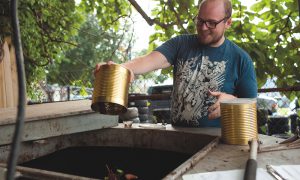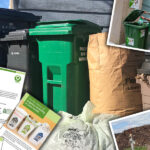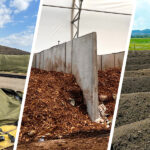BioCycle October 2014
Seattle, Washington: City Sets Organic Waste Fine To Meet Recycling Target
Beginning next July 1, Seattle area households, apartment buildings and businesses that include more than 10 percent organic waste by volume in their bins or dumpsters will be fined, following the City Council’s unanimous vote to establish the ordinance in late September. Under the new rule, trash collectors may check containers that they dump into a truck. If they see compostable items taking up 10 percent or more, they will enter the violation into their truck’s existing computer system and leave a ticket on the trash bin that tells the customer to expect a fine on their next bill. Single-family households will be charged $1, while apartment buildings and businesses will pay $50, but only upon a third notice of violating the >10 percent rule. For the first six months of 2015, trash collectors will tag bins and dumpsters with “educational” tickets when they find violations. Prohibited items include all food and compostable paper, including food-contaminated cardboard, paper napkins and paper towels.
Furthermore, in a change from current practice, as of January 1, 2015, all commercial establishments that generate food waste or compostable paper will have to subscribe to a composting service, compost their food waste on-site, or self-haul their food waste for processing. Since Fall 2011, apartment buildings and businesses that generate food waste and compostable paper have been required to provide compost bins, but have not been required to “see that all of the food waste gets in there,” says Timothy Croll, Seattle Public Utility’s (SPU) solid waste director.
He adds that single-family residences have been required since 2009 to subscribe to curbside organics recycling, “unless they do backyard composting, which is only about 4 percent of our customers.” The new ordinance exempts public litter cans and garbage containers in customer dining areas when the business provides containers for food waste collection.
SPU asked City Council to consider the measure because of concern that its 56 percent waste diversion rate for 2013 was not high enough to reach its target of 60 percent for 2015. Seattle sends approximately 100,000 tons of food waste to a landfill in eastern Oregon each year. Based on its existing recycling experience, SPU projects that the food waste law will divert 38,000 tons of food scraps from the landfill via composting. In a recent survey, 74 percent supported and 11 percent opposed the rule, according to the office of Councilwoman Sally Bagshaw, who sponsored the legislation. Cities including San Francisco and New York have instituted mandatory composting programs, and San Francisco fines building owners if they fail to provide tenants with adequate bin service and information on their proper use. But none appear to levy fines for excessive dumping of organic waste.
Philadelphia, Pennsylvania: Urban Dirt Factory
The University City District (UCD) in the University City area of West Philadelphia is a nonprofit involved in community revitalization that services neighborhood institutions, small businesses and residents. One of its projects is the Dirt Factory, a community composting operation opened in 2012 and located on a 2,500-square foot formerly overgrown, trash-strewn vacant lot. Neighborhood residents can drop off their vegetative (nonprotein) food waste. The owner of the lot allows UCD to use it rent-free. The Dirt Factory has two 3 cubic yard Green Mountain Technologies Earth Tubs. About 70 to 90 gallons/week of food waste are dropped off and added to the Earth Tub, along with about 200 gallons of dried leaves. It takes about six to eight weeks to collect enough compostable material to fill one tub. Then it takes about a month to go through active composting, with a power auger used to turn the material five days a week, according to Seth Budick, UCD’s policy and research manager. While material in one tub is being composted, the other tub is having more organic material added to it.
After about a month, the composting material is piled in “corrals” on a paved surface and covered with tarps. It cures for a minimum of one month, and depending on seasonal weather conditions, sometimes for several months, Budick says. Odor management has not been a problem: “As long as we capture the leachate, we can minimize odors,” he explains. A finished load of about 400 gallons of compost is produced every six to eight weeks. Neighborhood residents can pick up as much compost as they need for use in their gardens (the facility is open to the public one morning and one afternoon per week). The District uses the compost in its own public space landscaping projects. The Dirt Factory produces a total of about 10 tons/year of finished, high-quality compost.
“The program has been very well received in the neighborhood,” adds Budick. The number of households dropping off organic material has increased from 5 to 10 per week at the beginning, to the current level of 25 to 30 households per week. “Based on the demand we’ve seen, we could expand,” he says. “We’re looking for opportunities to do that, either by expanding the facility or opening additional sites elsewhere in the neighborhood.”
Some of the space on the lot is used as an open-air “classroom” that other community groups can use for events, thereby exposing more people to the composting concept.
Washington, D.C.: Soil Rebuilders Advanced Composter Training
The Institute for Local Self-Reliance and ECO City Farms have partnered with the Washington, D.C. Department of Parks and Recreation to offer “The Neighborhood Soil Rebuilders Advanced Composter” training program to residents of the Washington, D.C.-Maryland region. The Neighborhood Soil Rebuilders program is a community composter train-the-trainer program that will run from November 1 through December 15, 2014. The course consists of 12 hours of classroom instruction, about 22 hours of supervised hands-on training, implementation of a capstone project (geared toward current students), and 30 hours of independent projects/community service focused on advancing community composting.
Topics covered include: Small-scale composting process; Vermicomposting; Uses for finished compost; How-to design and build on-site composting systems; and Techniques for engaging community participation. The capstone project and community service components are designed for participants to apply what they learn in their own community, such as building and managing a compost bin at a community garden. Upon completion of the Neighborhood Soil Rebuilders Advanced Composter course, students will receive a certificate and have the option of continuing on to the Neighborhood Soil Rebuilders Master Composter train-the-trainer apprenticeship. Contact NeighborhoodSoilRebuilders@gmail.com for possible openings and/or future classes.
Denver, Colorado: Organics Diversion At Arts And Music Venues
Denver Arts & Venues, the City and County of Denver agency responsible for the city’s publicly-owned venues and cultural affairs, announced plans in late August to divert organic waste generated at its venues — including the world-famous Red Rocks Amphitheater — to composting. Two local companies are partnering with Denver Arts & Venues to help compost and recycle trash from Red Rocks, the Colorado Convention Center, the Historic Denver Coliseum and the Denver Performing Arts Complex. Eco-Products, based in Boulder, will supply the sustainable foodservice packaging, including compostable beer cups and nacho trays. Alpine Waste & Recycling, based in Commerce City, will pick up and process all recyclables and organics from the venues. Its yard trimmings and food waste composting facility is located in Bennett, Colorado. Red Rocks, as well as the other venues, already have diversion programs in place. The new initiative is targeted at diverting more of the organics stream. The only food service packaging available will be compostable, aiding in increased diversion. Eco-Products is embossing all of the cups and plates with a special logo and design, reminding patrons that the packaging is compostable. “What better time to reach people than when they’re relaxed, taking in a concert and having a beer?” notes Wendell Simonson of Eco-Products. “They’re holding a cup and seeing that they can place it in something other than a trash bin.”
New York, New York: Trading Food Scraps For Food
Imagine trading food scraps in exchange for credits toward locally-grown produce that is fertilized with compost made from the traded food scraps. That is the concept behind Hello Compost, an innovative food scraps collection program started in New York City in Fall 2013 as a pilot. Aly Blenkin and Luke Keller were in a Transdisciplinary Design Masters program at Parsons The New School for Design when they met Linda Bryant, Founding Director of Project EATS, an organization that facilitates development of urban farms in working class communities in New York City. Working together, the team created Hello Compost to encourage participation in a food scraps collection program by exchanging credits toward produce grown at Project EATS farm sites for source-separated food scraps. Participants are provided odor-blocking canvas totes for freezing scraps, and told to bring the scraps to a Project EATS market where they are weighed in order to give a corresponding credit amount towards produce from the market. Project EATS then composts the scraps at its farm sites. Hello Compost even has its own online app that enables participants to track the amount of organics they divert, and produce credits they earn. Visit www.hellocompost.com.
Evanston, Illinois: Food Scrap Collection Service
Composting food scraps poses special challenges for city residents, due to limited space, municipal restrictions, and other factors. But Evanston-based entrepreneur Erlene Howard’s four-year old food scraps pick up service, Collective Resource, has been providing a new option for a growing number of Chicago area residents and businesses. Howard, a frequent consumer of organic fruits and vegetables and locally farmed meat, became interested in composting but couldn’t find suitable space to do it “in my condo environment.” She was inspired to start her food scraps recycling service when she realized that “if we made composting easier, more people would do it.” A bookkeeper by trade, Howard started Collective Resource on a part-time basis in Spring 2010 with three customers, using her Toyota Camry to haul their containers to Waste Management’s Harbor View composting facility in Chicago.
Today, Collective Resource is a full-time endeavor. Howard uses two Sprinter cargo vans to collect pre and postconsumer food scraps, including meat and dairy, weekly from about 260 residential and 60 commercial customers in an area that extends from the South Loop, north to Lake Forest, along the north shore of Lake Michigan. Soiled paper and cardboard can be included. About 12 to 15 tons/week are collected. Residential customers pay $10.50/week for pickup of a 5-gallon bucket, while commercial customers use 32-gallon totes. Commercial fees depend on location and volume collected, Howard says. Collective Resource pays a $47/ton tipping fee at the Harbor View facility. The operation composts grass, brush, tree limbs and food scraps, using the turned windrow method, and a Scarab turner. The site produces about 25,000 cubic yards/year of compost, sold mainly to landscape contractors and soil blenders, according to Lisa Disbrow of Waste Management.
The spring, Collective Resource received a boost with a $71,777 F-SCRAP (i.e., food scrap) grant from the Illinois Department of Commerce and Economic Opportunity’s Office of Energy and Recycling to purchase a new collection vehicle, food scrap collection containers and a commercial-grade dishwasher that will be installed for container washing facility. The company has to match the grant with $10,753 of its money. The competitive F-SCRAP Grants Program was established five years ago to help advance food scrap collection and processing in Illinois.















